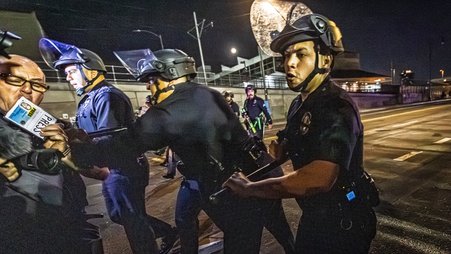Press freedom just scored a $3 million win in Kansas. The county that participated in an illegal raid on the Marion County Record in 2023 is cutting big checks to journalists and a city councilor to settle their lawsuits.
As part of the settlement, the Marion County Sheriff’s Office also made a statement of “regret” for the raid, saying, “This likely would not have happened if established law had been reviewed and applied prior to the execution of the warrants.”
You think? Any police officer or judge with half an understanding of the First Amendment should’ve known better than to ask for or sign off on the raid on the Record and the home of owners Eric and Joan Meyer.
But apparently, police don’t always read the law, and judges may need a refresher, too. Let’s break down the flashing red lights any judge or cop should heed before storming a newsroom.
The First and Fourth amendments strongly protect against searches of journalists and newsrooms.
Under the Fourth Amendment, a search warrant must be supported by probable cause, which means a likelihood that contraband or evidence of a crime will be found at a particular place. The government must also specify the place to be searched and the thing to be seized.
When a search warrant targets materials protected by the First Amendment — like notes, recordings, drafts, and materials used or created by journalists — the Fourth Amendment’s requirements must be scrupulously followed, the Supreme Court has said.
This means that judges must be extra strict in applying the Fourth Amendment’s requirements when a search impacts First Amendment rights, which it will any time it involves a journalist or newsroom. What judges should never do is allow overly broad searches where police rifle through journalists’ desks and computer files willy-nilly in the hopes of turning up something “incriminating.”
The Privacy Protection Act of 1980 forbids the use of search warrants to seize materials from journalists, with only a few narrow exceptions.
The PPA is a federal law that requires law enforcement to get a subpoena, not just a search warrant, in most cases when dealing with reporters and newsrooms. Subpoenas give journalists the chance to challenge a demand for documents or equipment in court before police can seize them. If police had sought a subpoena for the Record’s newsgathering materials, for instance, the newspaper could have successfully challenged the demand in court, meaning that the newsroom would never have been raided and the Record’s confidential sources would have been protected.
There are narrow exceptions to the PPA’s subpoena requirement, including when there is probable cause to believe a journalist has committed a criminal offense related to the material sought. But, in general, the offense cannot relate to the receipt, possession, communication, or withholding of newsgathering materials or information.
Journalists can read a guide on our website for more information about the PPA.
State shield laws are another barrier to newsroom searches.
Almost every state has a reporter’s shield law on the books that protects journalists from the compelled disclosure of their confidential sources and unpublished information, and sometimes protects against the forced disclosure of nonconfidential information, too. Courts around the country have also recognized a First Amendment and common law reporter’s privilege that can provide similar protections.
Kansas’ shield law, for instance, applies to “any information gathered, received or processed by a journalist, whether or not such information is actually published, and whether or not related information has been disseminated.” It forbids compelling a journalist from disclosing unpublished information or confidential sources until after a court hearing.
Other states’ shield laws have similar protections. Barging into a newsroom and searching it violates those laws and the established processes for law enforcement to obtain information from the press.
Accessing publicly available information or information provided by a source is not a crime, and is protected by the First Amendment.
Seems obvious, but judging by how often this comes up, maybe not.
Everyone has a First Amendment right to read, watch, or view publicly available information. It’s not a crime to access a record made publicly available by a government agency (as reporters at the Record did), to read something that someone published on a public website, even if it was published by accident, or to photograph police officers in public.
Journalists also have a right to publish information given to them by a source, even if the source obtained it illegally, as long as the journalist didn’t participate in the illegality. That means that if a source gives a journalist a document or recording that the source stole, the journalist can’t be punished for publishing it.
Because these things are not crimes, it also means that accessing publicly available information or publishing information that a source illegally obtained can’t be the basis for a raid on a newsroom or search of a journalist’s materials.
Next time, think before you raid.
The $3 million settlement is a step toward accountability, but it can’t undo the damage to the Record’s journalists or sources, and especially not to Joan Meyer, who died the day after police invaded her home.
If local communities don’t want to keep learning First Amendment law the expensive way, they must insist that law enforcement actually read the Constitution and the law before targeting the press.





